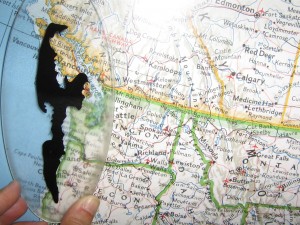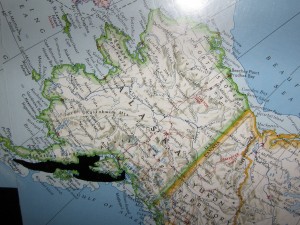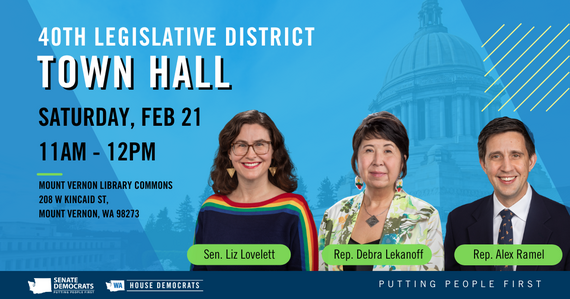
The Alaskan "Exxon Valdez" surface oil spill, here represented at 11 million gallons, though estimates vary between 11 and 39 million, extrapolated onto Salish Sea and Pacific Ocean waters. (Courtesy of the Pratt Historical Museum).
“Tool for balancing and regulating the multiple uses of shoreline and aquatic lands” is signed into law
From State Senator Kevin Ranker’s Office
After President Barack Obama signed an executive order establishing the first-ever national ocean policy on July 20, state Sen. Kevin Ranker, D- San Juan, said Washington is uniquely positioned to benefit from this unprecedented effort to coordinate national policy for our oceans and coastlines.
“Nothing has highlighted our nation’s dependence on healthy oceans and coasts more than the current BP oil spill disaster,” said Ranker. “A massive spill in the Puget Sound or on our coast is unthinkable, but it’s not impossible. It’s clear that we can and must do better in how we protect and manage our oceans.”
The new federal ocean policy framework includes marine spatial planning as a key element, which Ranker helped establish as state policy when his Senate Bill 6350 passed into law in the 2010 legislative session. Washington became only the second state in the nation to adopt this tool for balancing and regulating the multiple uses of shoreline and aquatic lands – which include fishing, aquaculture, shipping, recreation and potential renewable energy facilities – in a comprehensive manner.

The range of the "Exxon Valdez" Alaskan oil spill of 1989, as depicted at the Pratt Historical Museum.
“At the federal level, you have 20 separate agencies trying to implement 140 separate and sometimes conflicting laws governing specific activities like commercial fishing, coastal development, water pollution control, issuing oil and gas contracts – just to name a few,” said Ranker. “It’s time for a management structure to not only identify all the multiple management objectives but also to coordinate across agencies and with the states to help us uniformly manage our ocean resources and protect them from harm. That’s what we’ve done in Washington and our efforts will fit beautifully with the same approach now being adopted at the federal level.”
Over a year ago President Obama convened a task force of 24 federal agencies and ordered them to develop recommendations for a policy that protects, maintains and restores our ocean, coastal and Great Lakes ecosystems. Ranker testified before the task force at the White House Conference Center.
“Those who depend on our aquatic resources – those in fishing, shipping and energy, as well as conservationists and recreationists – know that protecting our marine resources means protecting Washington’s economy and our nation’s economy now and into the future,” said Ranker. “There’s no question that we need to repair the damage in the Gulf of Mexico, but we especially need to work towards the future now with the type of national ocean policy that, among other things, will help ensure that a similar disaster never happens again.”
**If you are reading theOrcasonian for free, thank your fellow islanders. If you would like to support theOrcasonian CLICK HERE to set your modestly-priced, voluntary subscription. Otherwise, no worries; we’re happy to share with you.**








Enough with the Ranker self-promotion!